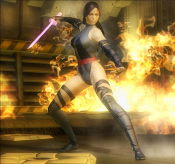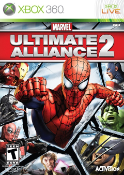Marvel: Ultimate Alliance 2 Review
|
|
See PixlBit's Review Policies

On 10/17/2009 at 10:30 PM by Neal Ronaghan No one ever found out why a group of 20 superheroes would only send out four at a time. |

A fun game for anyone who loves comics and/or dungeon-crawling RPGs, and can deal with repetition.
The Marvel Universe action RPGs began when Raven Software made X-Men Legends, which was a landmark game for me as it was one of the first comic book games to borrow so heavily from the source material. The fourth entry in that series is Marvel: Ultimate Alliance 2, which is the first in the series not done by Raven. The final product is quite similar to Raven's last effort and brings some new ideas to the table, but also brings some questionable ones.

The game's story plays a big role and borrows heavily from the recent Marvel Civil War storyline in the comics where Captain America and Iron Man found themselves at odds over the Superhero Registration Act that forces superheroes to reveal their identities and register with the government. It's an interesting yarn and is presented nicely, but the most important thing that you need to know about it is that there are two paths to the game: Iron Man-led Pro-Registration and the Captain America-led Anti-Registration. When you side with one, three characters will remain locked out for a majority of the story.
The Baldur's Gate-style gameplay returns as you can take up to four players locally or online and burn through masses of enemies. You have different melee attacks and four special attacks for each character. However, most of these special attacks are similar. For example, Human Torch and Iceman have almost duplicate powers, except one has fire-based attacks and the other has ice-based ones. Still, the powers are easy and fun to use, and you don't have to worry about running out of power for them since the stamina bar that is used for them is constantly recharged.

The new wrinkle in the gameplay is the Fusion moves, where two characters team up for one devastating attack. These are exciting to watch, until you realize that there are only three different types of them and they all kind of look the same. That fits in with one of the big issues of the game: the characters play generically. You have all of these different colorful comic book characters and they only come from about four different archetypes. Except Deadpool, who is awesome in Ultimate Alliance 2.
A big change from the previous game is the camera perspective, which is now more of a tilted birds-eye view. To put it bluntly, it is awful. It focuses you on the action in a very specific area and oftentimes prevents you from seeing straight ahead. Also, it becomes a chore to keep everyone organized and on screen together when you play with friends. It is especially frustrating when the fight spills over off-screen and you are warring for camera control supremacy with your co-op partner.

The leveling system sees a streamlined upgrade as most of it can be done in-game. As with past games, you can always just set it to auto-level and play through the game, but players who want to tinker with each character can go in and tailor characters to their liking. The Team Boosts, of which there are more than 200, give boosts to a variety of abilities and they can be switched around on the fly.
As usual for the series, Ultimate Alliance 2 has a trivia contest, simulator missions, and more comic book references than you can shake a stick at. Unfortunately, it still features the repetitive gameplay that past games had.
If you loved the past games and want more, then Marvel: Ultimate Alliance 2 is well worth it. This new game won't be attracting much more outside of Baldur's Gate or Marvel fans, but if this is your bag, it is a lot of fun. Just don't expect anything new and ground-breaking.










Comments